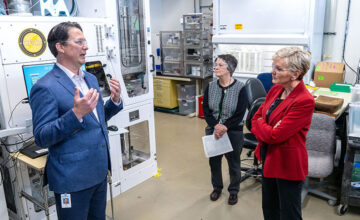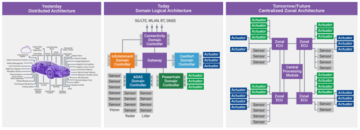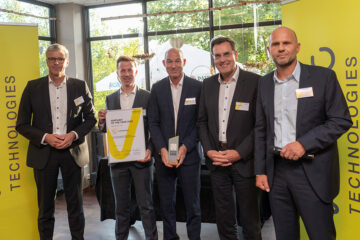News: Microelectronics
9 April 2024
Houqiang Fu, an assistant professor of electrical engineering in Arizona State University’s Ira A. Fulton Schools of Engineering, has received a 2024 National Science Foundation (NSF) Faculty Early Career Development Program (CAREER) Award to explore the potential of the ultrawide-bandgap semiconductor material aluminum nitride (AlN) for enhanced power electronics.
Fu aims to develop AlN-based power field-effect transistors (FETs) that control power flow with greater efficiency and can handle higher temperatures and more voltage than those made with silicon. AlN is also expected to perform better in power electronics than wide-bandgap semiconductor materials such as silicon carbide and gallium nitride.

Picture: Houqiang Fu, assistant professor of electrical engineering in Arizona State University’s Ira A. Fulton Schools of Engineering,. Graphic by Erika Gronek/ASU.
“Aluminum nitride power electronics can offer superior performance and significantly impact grid modernization, transportation electrification and greenhouse-gas emissions,” Fu says. “The electronics will also dramatically increase the current grid infrastructure’s resilience, reliability and efficiency. They will also help mitigate power disruptions’ health and economic impact and improve energy security.” He adds that, due to the material’s ability to better conduct electricity, aluminum nitride can eventually lead to lower electricity costs for consumers and accelerate grid integration of renewable energy sources such as solar and wind power.
Beyond applications in the power grid, AlN devices can increase the range of electric vehicles on a single charge. With 53% of consumers surveyed by the American Automobile Association citing worries about range as a primary concern discouraging them from adopting electric vehicles, Fu expects that improving range will improve uptake among consumers.
Developing a blueprint for future power electronics
While aluminum nitride has promising properties, a lack of knowledge regarding how to effectively use the material for power electronics prohibits it from reaching its full capabilities.
To better understand how to build power electronics using AlN, Fu will lead a five-year investigation to determine how best to overcome the main problems facing use of the material.
The research, much of which will take place in the semiconductor-focused portions of ASU Core Research Facilities, will focus on how best to grow the crystals needed for manufacturing AlN, refine it, fabricate it into power electronic devices and integrate the devices into electrical systems.
While Fu will serve as the sole faculty member involved in the project, he will have two doctoral students assisting him, as well as master’s and undergraduate students through programs such as ASU’s Master’s Opportunity for Research in Engineering (MORE), the TSMC AZ Fellowship and Fulton Undergraduate Research Initiative (FURI).
“For those who are interested in a career in the microelectronics industry, this research area can equip them with interdisciplinary skills that are highly sought after in the semiconductor field, such as nanofabrication, material characterization, semiconductor device physics, material growth and more,” Fu says.
- SEO Powered Content & PR Distribution. Get Amplified Today.
- PlatoData.Network Vertical Generative Ai. Empower Yourself. Access Here.
- PlatoAiStream. Web3 Intelligence. Knowledge Amplified. Access Here.
- PlatoESG. Carbon, CleanTech, Energy, Environment, Solar, Waste Management. Access Here.
- PlatoHealth. Biotech and Clinical Trials Intelligence. Access Here.
- Source: https://www.semiconductor-today.com/news_items/2024/apr/asu-090424.shtml
- :has
- :is
- 2024
- a
- ability
- About
- accelerate
- Adds
- Adopting
- After
- aims
- ALN
- also
- American
- among
- an
- and
- applications
- April
- ARE
- AREA
- arizona
- AS
- Assistant
- assisting
- Association
- automobile
- award
- BEST
- Better
- blueprint
- build
- by
- CAN
- capabilities
- Career
- charge
- citing
- Concern
- Conduct
- Consumers
- control
- Core
- Costs
- Current
- Determine
- develop
- Development
- device
- Devices
- dramatically
- due
- Early
- Economic
- Economic Impact
- effectively
- efficiency
- Electric
- electric vehicles
- electrical engineering
- electricity
- electrification
- Electronic
- Electronics
- Emissions
- energy
- Engineering
- enhanced
- equip
- Erika
- eventually
- expected
- expects
- explore
- facilities
- facing
- field
- flow
- Focus
- For
- For Consumers
- Foundation
- from
- fu
- full
- future
- graphic
- greater
- Grid
- Grow
- Growth
- handle
- Have
- he
- Health
- help
- higher
- highly
- him
- How
- How To
- HTTPS
- Impact
- improve
- improving
- in
- Increase
- industry
- Initiative
- integrate
- integration
- interested
- into
- investigation
- involved
- IRA
- IT
- ITS
- jpg
- knowledge
- Lack
- lead
- lower
- made
- Main
- manufacturing
- master’s
- material
- materials
- member
- Mitigate
- modernization
- more
- much
- National
- National Science
- needed
- NSF
- of
- offer
- on
- Opportunity
- Overcome
- perform
- performance
- Physics
- Place
- plato
- Plato Data Intelligence
- PlatoData
- portions
- potential
- power
- Power grid
- primary
- problems
- Professor
- Program
- Programs
- project
- promising
- properties
- range
- reaching
- received
- receives
- refine
- regarding
- reliability
- Renewable
- renewable energy
- research
- resilience
- says
- Schools
- Science
- Science Foundation
- security
- semiconductor
- serve
- significantly
- Silicon
- silicon carbide
- single
- skills
- solar
- sought
- Sources
- State
- Students
- such
- superior
- surveyed
- Systems
- Take
- than
- that
- The
- Them
- they
- this
- those
- Through
- to
- transportation
- Tsmc
- two
- understand
- uptake
- us
- use
- using
- Vehicles
- Voltage
- WELL
- which
- WHO
- will
- wind
- wind power
- with
- zephyrnet












